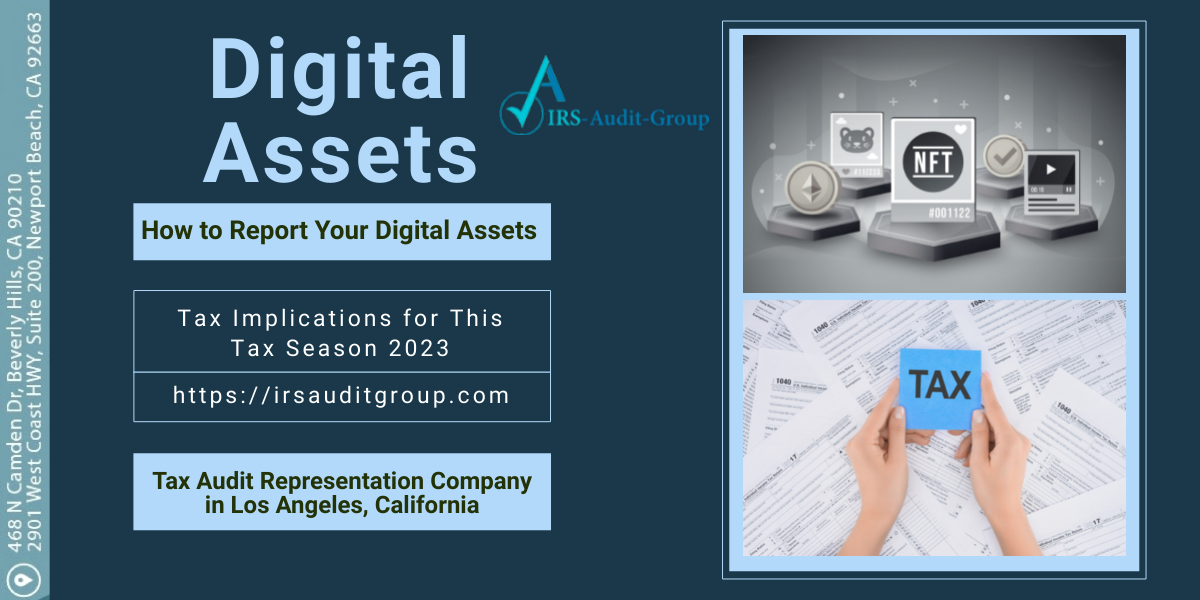Cryptocurrencies and other digital assets have experienced an increase in activity and acceptance by the public in recent years. For this Tax Season 2023, the IRS has increased its efforts to provide assistance to taxpayers on the tax treatment and reporting requirements related to these digital assets. The IRS has introduced the new term “digital assets“ to refer to “virtual currencies”.
What is Digital Asset?
Any digital representation of value that is on a cryptographically protected distributable ledger or any other equivalent technology as specified by the Secretary is referred to as a digital asset, according to the IRS. The IRS lists a number of instances of digital assets, including NFTs, stablecoins, as well as virtual currencies like a cryptocurrency that can be used for payments (non-fungible tokens that are unique digital identifiers recorded in a blockchain).
Disclosure on Individual Tax Return
To assist taxpayers in providing accurate answers, the guidelines for answering the question have been clarified and broadened in this tax year 2022 forms. Every individual filer must respond to the question with simple “yes” or “no” answers on the front of Form 1040, U.S. Individual Income Tax Return, whether they received or sold a digital asset in the tax year 2022, regardless of whether they are associated with digital assets or not. The subject, which is now on 2022 forms, gives more information and specificity to help taxpayers understand when to correctly mark the “Yes” or “No” boxes.
When to Check “Yes” Or “No”?
In general, if a taxpayer got digital assets in the form of a payment, prize, or award, they should check “Yes”. Also, a taxpayer should select “Yes” if they obtained digital assets as a result of mining or a hard fork (the division of a cryptocurrency into two). A taxpayer should also tick “Yes” if they have given up any other financial stake in a digital asset by payment, sale, exchange, or swap for another digital asset. Check “No” if a taxpayer simply owned digital assets during the year without engaging in any transactions. A taxpayer should also select “No” when transferring digital assets between accounts that share the same owners or when buying digital assets with money that isn’t digital.
How to Report Digital Asset Income?
Digital asset income is reported in much the same way as other revenue, mostly dependent on the source of the income. If digital assets are received in exchange for work, the taxpayer must disclose the value of those assets as wages on your tax return 2022. If the digital assets received were payment for services provided, the value of those assets would be reported on Schedule C, Profit or Loss from Business. Similarly, Schedule C would also record any such dispositions of digital assets to clients made in the course of a trade or company.
If digital assets are held as capital assets and sold, exchanged, or transferred it during the tax year 2022, the investor must use Form 8949, Sales and Other Dispositions of Capital Assets to calculate the gain or loss from that activity. The gain or loss is then reported on Schedule D, Capital Gains, and Losses. If, however, digital assets were transferred to an individual as a gift other than the taxpayer’s spouse during the tax year 2022, Form 709, United States Gift (and Generation-Skipping Transfer) Tax Return, will generally need to be filed if the value exceeds $16,000.
An incorrect or false response to the updated digital asset question could create complications for taxpayers in the future. For instance, an incorrect response may result in various types of penalties. The advice and assistance from knowledgeable Dual Licensed Tax Professionals and CPAs might be helpful when deciding how to answer the digital asset question instance.
IRS Audit Group is a tax audit representation firm in Los Angeles, California. Usually, in a few cases, the IRS may ask for more information to validate the tax return filings. But rarely, IRS may like to audit your tax information through a letter of notice via Mail. In such cases, it is important to engage a tax professional like ours to represent your tax audit. Our licensed professionals comprise qualified CPAs and IRS Enrolled Agents. They can analyze your tax situation and help alleviate your burden. Please contact us for more information. https://irsauditgroup.com/contact/
Telephone Number: (310) 498-7508

